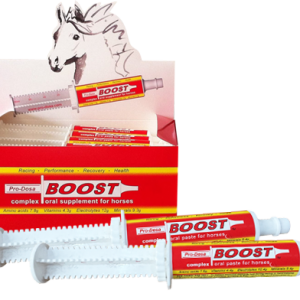Could Pro-Dosa BOOST produce a positive test? This question was asked of us frequently by trainers and horse owners, a few years ago. At the time, Pro-Dosa BOOST only had 1 mg of cobalt per tube, so the short answer was, “no, it wouldn’t produce a positive test”. We were asked the question many times though, and we felt there were likely many, many more horsemen who had the same concerns but who did not contact us to ask. We decided we had better take action to try to get some information out there for the wider horse community to see.
Cobalt has become a very significant issue in racing and other sports over the past few years. Following positive tests in Australia, racing authorities have made cautionary statements about the administration of cobalt to horses, and it has been reasonably well publicised that administering it at levels that result in the excretion of more than 100-200 micrograms of cobalt per litre of urine (depending on the racing jurisdiction) will result in a positive test. What hasn’t been explained is how much cobalt you can safely feed before those levels are reached. Racing jurisdictions have been working towards finding that threshold but have not yet released any information.
On a more basic level, horsemen and veterinarians have been provided with very limited information about the impact of “normal” levels of cobalt in the feed on the cobalt levels in urine. “Normal” levels may be significantly less than the threshold doses that will eventually be established. Instead, regulatory authorities have said that cobalt deficiencies are not common in horses, and they have recommended that it should be eliminated, as much as possible, from the equine diet until data is published indicating the maximum amount that can be fed.
What is cobalt and how much do horses require? Cobalt is a trace element needed by horses in very small amounts to facilitate normal physiology and metabolism. It is naturally present in feed stuffs, but as levels may be quite low, it is generally included in the formulation of prepared feeds and supplements.
The National Research Council (NRC) pre-2011, recommended daily dietary requirement is at least 0.1mg of cobalt per kilogram of dry matter intake per day. Your average 500kg racehorse can be expected to eat 2% of their body weight per day, which would be 10kg of feed on a dry matter basis. 10kg dry matter intake X 0.1mg cobalt required per kg dry matter = 1mg of cobalt required per day for normal health. According to NRC, resting horses require about half of that. NRC 2011 standards list reduced minimum requirements, ranging from 0.5mg to 0.6mg, depending on age and level of work.
In virtually all cases, feed companies use NRC guidelines when developing formulations, so most complete feeds will contain at least 1mg of cobalt per day, when fed as directed. A horse’s cobalt needs, therefore, should be readily met by its basic feed intake, as long as the cofactors needed for absorption and function are present in the diet. As horses in training for competition and racing are generally fed a well-balanced diet, most will be receiving the cobalt needed for normal health.
After completing a cobalt clearance study in Standardbred horses in training, in New Zealand, we concluded that we could remove cobalt from our formulation while feeling confident that Pro-Dosa BOOST would still provide complete and balanced nutritional support for optimal performance, recovery, and health. We wanted to ensure that trainers and horse owners, from all disciplines, could incorporate Pro-Dosa BOOST in their training regime, without any concern about producing a positive test for cobalt.
If you would like to read more about our findings, please follow the link to our cobalt clearance study.




